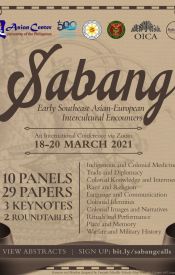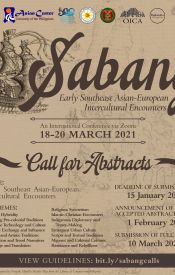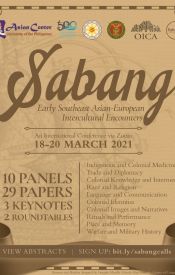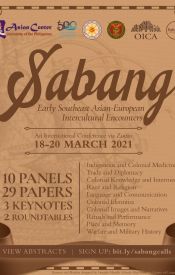MARCH 18: PROGRAM
Click/unclick on the tabs to view/close the content. Multiple tabs can be open at the same time.
Click on the titles to pop up the abstracts. View PDF of Program and Book of Abstracts.
09:00 am • Opening Program

9:00 am–9:15 am
OPENING PROGRAM
National Anthem of the Philippines
Welcome Remarks
Fidel Nemenzo, DSc, Chancellor, University of the Philippines Diliman
Cecilia de la Paz, PhD, Director, Office for the Initiatives of Culture and the Arts, University of the Philippines Diliman
Joefe B. Santarita, PhD, Dean and Professor, Asian Center, University of the Philippines Diliman
House Rules and Conference Guidelines
09:15 am • Keynote 1: Southeast Asia and the Quincentennial Commemoration of the First Circumnavigation of the World

9:15 am–9:45 am
KEYNOTE LECTURE
Southeast Asia and the Quincentennial Commemoration of the First Circumnavigation of the World
Dr. Rene R. Escalante, Chair, National Historical Commission of the Philippines
09:45 am • Panel 1: Indigenous and Colonial Medicine

09:45 am–11:15 am
PANEL 1: INDIGENOUS and COLONIAL MEDICINE
Traditional Medicine in the Philippines and Early Southeast Asian-European Encounters
Michael L. Tan, University of the Philippines Diliman • Watch on YouTube
The Hilot of the Philippines and the Dukun Bayi of Indonesia Compared
Ma. Luisa T. Camagay, Department of History, University of the Philippines Diliman • Watch on YouTube
MSS 2996: Curiosity to A Medicinal Chest?
Mohd Affendi B. Mohd Shafri, International Islamic University Malaysia • Watch on YouTube
12:15 pm • Panel 2: Trade and Diplomacy

12:15 pm–1:45 pm
PANEL 2: TRADE AND DIPLOMACY
Addressing Southeast Asian Leadership: Diplomatic Narratives and the Ordering of Colonial Knowledge
Stephen L. Keck, Emirates Diplomatic Academy, UAE • Watch on YouTube
Friendship and Unity Among Us: The Dutch-Asian Elephant Diplomacy in the Seventeenth Century
Pichayapat Naisupap, Leiden University • Watch on YouTube
Danes in the Manila Trade, XVII-XIX Centuries
Andrés del Castillo Sánchez, El Colegio de México AC • Watch on YouTube
02:00 pm • Panel 3: Colonial Knowledge and Intermediaries

02:00 pm – 3:30 pm
PANEL 3: COLONIAL KNOWLEDGE AND INTERMEDIARIES
Re-reading 'Sucesos:' Revisiting Morga in Some Books, Texts, and Places
Rolando Talampas, University of the Philippines Diliman
Tensions of Hybridity: Native Officers as Intermediaries in Scripting Colonial Order in British Burma
Alexey Kirichenko, Institute of Asian and African Studies, Moscow State University • Watch on YouTube
Spanish Manila’s Media Anata: Groundwork for Quantitative Global Histories from Below, 1654–1687
Nicholas C. Sy, University of the Philippines Diliman
03:45 pm • Roundtable 1: History, Theories, and Prospects of Philippine Studies as a Discipline

3:45 pm–5:00 pm
ROUNDTABLE 1: History, Theories, and Prospects of Philippine Studies as a Discipline
Discussion Questions
-
What do you think is the relevance of Philippine Studies in the age of globalization, and how can we situate this relevance within the context of the ongoing global health emergency?
-
In this age of globalization, should we jettison theories, approaches, and paradigms which, rightly or wrongly, purportedly border on the essentialist and nativist problematizing of Philippine culture and society? How about foreign theories? Should they be abandoned in the name of indigeneity and nationalism?
-
What are the prospects for Philippine Studies in the digital era? What are the challenges?
-
Considering that Filipinos have become, by some accounts, a diasporic people, what is the importance of Philippine Studies with respect to Filipino migrant communities? What is the role of these migrant communities in promoting Philippine Studies?
-
How can Philippine Studies help promote inclusivity? Has it really helped address some of the social ills that have beset the country? How?
Participants
Filomeno Aguilar, Jr. PhD
Professor, Ateneo de Manila University, Philippines
Noel Christian Moratilla, PhD
Assistant Professor, Asian Center, University of the Philippines
Cristina Martinez-Juan, PhD
Executive Officer, Philippine Studies @ School of Oriental and African Studies (SOAS)
09:00 am • Opening Program

9:00 am–9:15 am
OPENING PROGRAM
National Anthem of the Philippines
Welcome Remarks
Fidel Nemenzo, DSc, Chancellor, University of the Philippines Diliman
Cecilia de la Paz, PhD, Director, Office for the Initiatives of Culture and the Arts, University of the Philippines Diliman
Joefe B. Santarita, PhD, Dean and Professor, Asian Center, University of the Philippines Diliman
House Rules and Conference Guidelines
09:15 am • Keynote 1: Southeast Asia and the Quincentennial Commemoration of the First Circumnavigation of the World

9:15 am–9:45 am
KEYNOTE LECTURE
Southeast Asia and the Quincentennial Commemoration of the First Circumnavigation of the World
Dr. Rene R. Escalante, Chair, National Historical Commission of the Philippines
09:45 am • Panel 1: Indigenous and Colonial Medicine

09:45 am–11:15 am
PANEL 1: INDIGENOUS and COLONIAL MEDICINE
Traditional Medicine in the Philippines and Early Southeast Asian-European Encounters
Michael L. Tan, University of the Philippines Diliman • Watch on YouTube
The Hilot of the Philippines and the Dukun Bayi of Indonesia Compared
Ma. Luisa T. Camagay, Department of History, University of the Philippines Diliman • Watch on YouTube
MSS 2996: Curiosity to A Medicinal Chest?
Mohd Affendi B. Mohd Shafri, International Islamic University Malaysia • Watch on YouTube
12:15 pm • Panel 2: Trade and Diplomacy

12:15 pm–1:45 pm
PANEL 2: TRADE AND DIPLOMACY
Addressing Southeast Asian Leadership: Diplomatic Narratives and the Ordering of Colonial Knowledge
Stephen L. Keck, Emirates Diplomatic Academy, UAE • Watch on YouTube
Friendship and Unity Among Us: The Dutch-Asian Elephant Diplomacy in the Seventeenth Century
Pichayapat Naisupap, Leiden University • Watch on YouTube
Danes in the Manila Trade, XVII-XIX Centuries
Andrés del Castillo Sánchez, El Colegio de México AC • Watch on YouTube
02:00 pm • Panel 3: Colonial Knowledge and Intermediaries

02:00 pm – 3:30 pm
PANEL 3: COLONIAL KNOWLEDGE AND INTERMEDIARIES
Re-reading 'Sucesos:' Revisiting Morga in Some Books, Texts, and Places
Rolando Talampas, University of the Philippines Diliman
Tensions of Hybridity: Native Officers as Intermediaries in Scripting Colonial Order in British Burma
Alexey Kirichenko, Institute of Asian and African Studies, Moscow State University • Watch on YouTube
Spanish Manila’s Media Anata: Groundwork for Quantitative Global Histories from Below, 1654–1687
Nicholas C. Sy, University of the Philippines Diliman
03:45 pm • Roundtable 1: History, Theories, and Prospects of Philippine Studies as a Discipline

3:45 pm–5:00 pm
ROUNDTABLE 1: History, Theories, and Prospects of Philippine Studies as a Discipline
Discussion Questions
-
What do you think is the relevance of Philippine Studies in the age of globalization, and how can we situate this relevance within the context of the ongoing global health emergency?
-
In this age of globalization, should we jettison theories, approaches, and paradigms which, rightly or wrongly, purportedly border on the essentialist and nativist problematizing of Philippine culture and society? How about foreign theories? Should they be abandoned in the name of indigeneity and nationalism?
-
What are the prospects for Philippine Studies in the digital era? What are the challenges?
-
Considering that Filipinos have become, by some accounts, a diasporic people, what is the importance of Philippine Studies with respect to Filipino migrant communities? What is the role of these migrant communities in promoting Philippine Studies?
-
How can Philippine Studies help promote inclusivity? Has it really helped address some of the social ills that have beset the country? How?
-
Participants
Filomeno Aguilar, Jr. PhD
Professor, Ateneo de Manila University, Philippines
Noel Christian Moratilla, PhD
Assistant Professor, Asian Center, University of the Philippines
Cristina Martinez-Juan, PhD
Executive Officer, Philippine Studies @ School of Oriental and African Studies (SOAS)

